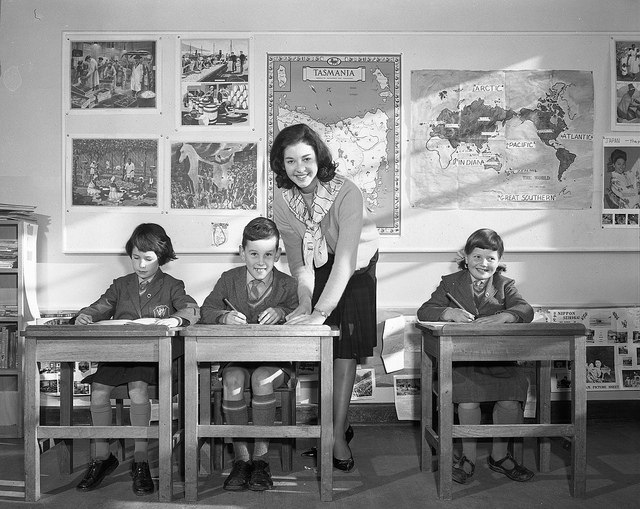
It may be time to challenge classical notions of what makes a good teacher and how they can be prepared, says Deborah Ball of University of Michigan. (Tasmanian Archive/ Flickr CC).
The burn-out rate for teachers in this country is high, nearly half leave the profession within five years. That doesn't come without consequences, American schools are falling behind. On Campus takes a look at what it would take to better prepare teachers, beginning in an unlikely place.
Before pilots can fly a plane, they have to follow systematic training.
"Very rigorous. All the procedures and trainings are very well defined," says Scott Pace, who is learning to be a flight instructor at Hanscom Air Force Base in Bedford, Massachusetts.
Pace's students will have to pass a series of exams demonstrating specific skills before they can take flight. It's all carefully supervised and closely regulated, because the stakes are high.
"My number one job as a flight instructor will be to keep the student safe. The plane safe, the flight safe, the people safe - on board, on the ground, everywhere," Pace explains. "That's the number one reason I'm there, because the student is not yet capable."
Relevant Story: The Art of Building Better Teachers
And just like pilots aren't allowed to fly solo until they are capable, Deborah Ball, dean of the University of Michigan’s School of Education, thinks teaching programs should follow the same principle.
That's the analogy Ball drew last summer when speaking about teacher preparation to a group of higher education leaders at a forum in Aspen, Colorado.
"A person who enters pilot school does not take a plane up on his own when he enters pilot school," Ball said. "Most teacher educators are proud of saying, 'Our candidates are out in schools from day one.' Really? Is that really a great idea that children are having people teaching them reading lessons who don't know anything about teaching?"
Six months after giving that talk, Ball says little has changed: the process for becoming a teacher still varies from state to state and there's no common curriculum for what teachers need to know.
“Obviously there are programs that prepare people well for teaching," Ball said in a recent interview. "Overall, as a nation, we grossly under-prepare people for this work and the fact that it's so variable and often quite minimal compared to other occupations is shameful."
Meanwhile, the U.S. Education Department is pushing for teacher training programs to be rated on how well their graduates' students perform on standardized tests. Higher education leaders, though, say the government is underestimating how much its regulations would cost colleges and states.
At Lesley University in Cambridge, Jessica Ganz, a middle school teacher in Chelsea, is working on earning her master’s in teaching. In Massachusetts, she needs a master’s degree to teach beyond five years, but she’s not sure it will make her a better teacher.
"A lot of this program is really designed for people who have never stepped into a classroom before, and so that's good," Ganz says. "But I feel like some of it is also really repetitive."
Jessica thinks a big part of what makes her a skillful teacher comes naturally - her easygoing personality and her patience working with kids.
"I don't know if it can be taught completely," Ganz says. "I think it's something you just have to be able to do. Nothing can really prepare you until you're in there and on the spot."
Another student, Laura Anderson, has gone back to school after working for years in finance. She’s confident she knows the mathematical content, but she’s taking the time to learn specific teaching skills before she leads a math class.
"As much as I want to think I could just stand in front of a class and tell them what I know or go from the textbook, there's more of a finesse involved and I'm learning that now," Anderson says. "There's really an art to putting together a lesson plan and to thinking through how you're going to move from one lesson to the next and engage your students."
And Laura says she still needs to practice those skills. Like millions of other novice teachers, she's just not quite ready to take flight.
Deborah Ball agrees, adding that the country is asking way too much of these new teachers.
"The lack of support for skillful teaching both initial training and ongoing opportunities for teachers to be supported to improve their work is a very important component to why schools often can't do the work we expect them to do,” says Ball.
Ball admits that there are other factors – school funding and teacher compensation – but she says U.S. schools will continue to underperform unless higher ed focuses on improving teacher preparation.










